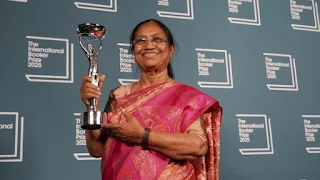Banu Mushtaq, born on April 3, 1948, in Hassan, Karnataka, is a trailblazing Indian writer, lawyer, and activist whose literary and social contributions have left an indelible mark on Kannada literature and beyond. Her short story collection, Heart Lamp: Selected Stories, translated into English by Deepa Bhasthi, won the prestigious International Booker Prize in 2025, making her the first Kannada-language author to achieve this honor. This landmark victory not only celebrated her evocative storytelling but also spotlighted the richness of Indian regional literature on a global stage.

Mushtaq’s journey began in a Muslim family, where she defied societal norms by pursuing education and marrying for love at 26. Enrolled in a Kannada-medium missionary school at eight, she mastered the language swiftly, beginning to write within days. Her literary career took root in the 1970s within the Bandaya Sahitya movement, a radical literary forum that amplified marginalized voices, particularly those of Dalits, Muslims, and women. As one of the few women in this space, Mushtaq’s stories confronted caste, class, and patriarchal oppression with unflinching honesty.
Her writing, often autobiographical, draws from her experiences as a lawyer, journalist, and activist. Heart Lamp, comprising 12 stories written between 1990 and 2023, explores the lives of Muslim women in southern India, addressing universal themes of gender inequality and resilience. The title story, reflecting Mushtaq’s own struggle with postpartum depression and a near-suicidal moment, portrays a woman’s despair and salvation through her children’s love. Her stories blend wit, satire, and emotional depth, challenging stereotypes and exposing societal hypocrisies.
Mushtaq’s activism parallels her literary work. She has advocated for Muslim women’s rights, supporting hijab-wearing students and challenging restrictive religious interpretations, even surviving a knife attack and a fatwa for her bold stance on women’s mosque access. Her commitment to social justice, rooted in her Bandaya involvement, underscores her belief that “no story is ever small.”
With six short story collections, a novel, an essay collection, and poetry to her name, Mushtaq’s work has been translated into Urdu, Hindi, Tamil, Malayalam, and English. Her story Karinaagaragalu inspired the 2003 Kannada film Hasina. Honored with awards like the Karnataka Sahitya Academy, Mushtaq remains a beacon of empathy and resistance, her words illuminating the struggles and strength of women worldwide.

Comments
Post a Comment
Comment